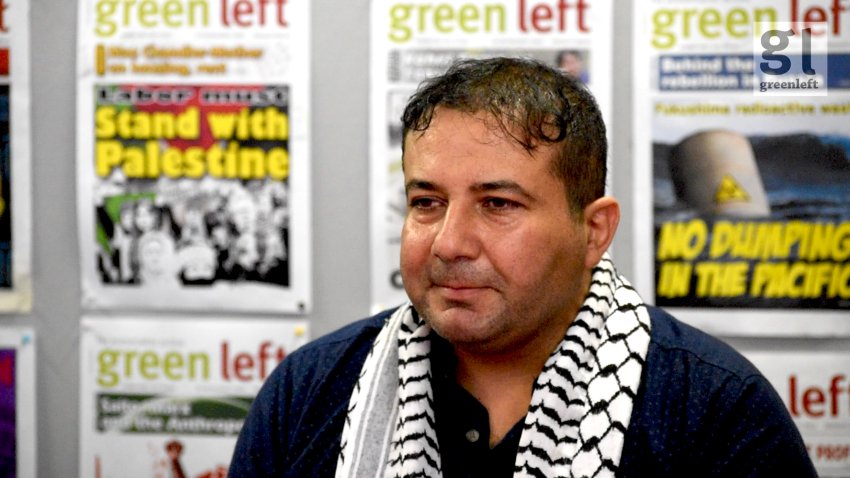
Shamikh Badra, a Palestinian Australian from Gaza, spoke to Green Left in February, the day after he had been told his father’s body, which had been hastily buried last year, had finally been moved to a cemetery.
His father died from being deprived of proper food and medicine by the Israeli occupation forces. He was buried in the backyard of their destroyed family home in Gaza.
Badra is a member of the international committee of the Palestinian People’s Party and founder of the Gaza Nippers program.
Shamikh and his brother Majed have been trying to get their elderly and ill mother out of Gaza for urgent medical attention, but she remains reluctant to move.
They also want to return to Gaza to help find missing family members, who are among the estimated 14,000 Gazans missing, presumed buried, under rubble.
“The situation is terrible. We don’t know if [our missing family members] are really under the rubble or if the Israeli forces have arrested them,” Badra said.
“We are thinking [about] how we can evacuate our mother because she is sick and old, and has been without medicine for the last 15 months.
“She has also been feeling the pressure from losing my father and my brother Ihab and his family in the bombing. But it is not easy to convince her to leave Gaza.
“The Palestinians don’t want to leave Gaza and my mother is just one example.”
This strong determination gives Badra confidence that US President Donald Trump’s dream of turning Gaza into a US-owned seaside resort, that has been ethnically cleansed of Palestinians, will fail.
“I am optimistic because [after] the Israeli military bombed Gaza with the equivalent of the power of several nuclear weapons, the Palestinians are still fighting despite the destruction and genocide.
“Palestinians are good at resisting colonialism. They don’t stop. [Israeli Prime Minister Benjamin] Netanyahu said he won’t stop fighting until the Palestinians stop resisting but he failed.
“The world should understand that the main reason for the resistance is the Israeli occupation. If they end the occupation, there will be peace.”
The Palestinians’ experience of the first Nakba (catastrophe) — when Zionists terrorist groups that drove about half the Palestinian population from their homes later formed the Jewish colonial ethno-state of Israel on stolen land — has shaped their resistance, Badra said.
“The main lesson is not to leave Palestine again. We were cheated in the first Nakba when the Arab armies came to Palestine and convinced people they could leave temporarily and then return, perhaps after a week.
“People believed the promises by Arab governments and left. Later they realised they had been cheated by the complicity of these armies and Israel.
“So, Palestinians have learned not to leave … Palestinians will stay in Palestine because this is the first lesson we learnt from the Nakba.”
The second lesson from the first Nakba, explained Badra, “is that we have to depend on ourselves”.
“We can’t leave Palestine and hope that the Arab states and their armies will help us.
“The third lesson is that all Palestinian factions [in the resistance] should respect and appreciate the people in Gaza who supported and protected the resistance. Without the people, the resistance would not have survived to continue the struggle.”
Palestinians should learn from the examples in other countries, he added.
“The Iraq regime [of Saddam Hussein] was defeated in just two weeks, because the people were not supporting that regime and the same in Syria.
“Even in Bolivia, when Ernesto Che Guevara went there to fight against United States imperialism, the people of Bolivia were not ready for revolution. It is important to understand that if the people don’t support the resistance, the resistance will not succeed.”
Badra said Trump’s idea that only the US can turn Gaza into a beach resort is an insult to Gazans, who had been enjoying and looking after its beaches for many ages.
For Palestinians in Gaza, the beach is important and it is “the only place for entertainment”.
Growing up in Gaza, Badra’s father took him to the beach twice a day, teaching him how to swim and, later, to become a lifeguard.
“After I came to Australia, I was thinking how to improve and develop the beach in Gaza. I found a good example in the Nippers program and we took it back to Gaza.
“We will continue the Gaza Nippers program despite the fact that the Israeli army has killed some of the children we trained [to surf] and members of our team.
“It is sad, but we will continue this project.
“This is our land and we have the right to self-determination.
“Trump is thinking that everything can be like business. No. Gaza is not for sale!”